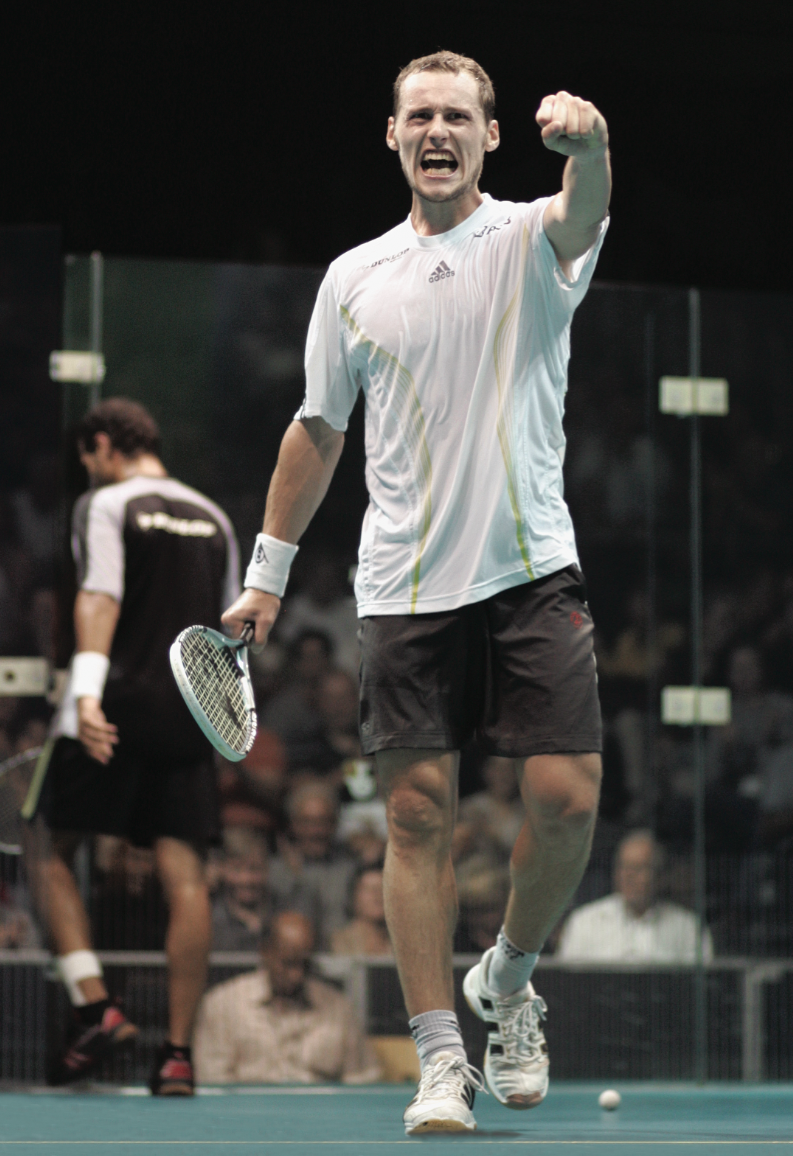
By Richard Eaton
Photos by Steve Line/SquashPics.com
The more the capital letter questions were put in their full and startling details, the more they sounded hard to believe.
How could the highest paid, highest profile female squash player ever, fall so suddenly from the heights? How could the first Asian woman to become number one, the heroine of multi-millions, the overwhelming favorite who had lost only one match all year, lose the British Open final so spectacularly?
How could she go two games up, and match point up in the fourth and still fail? And how could she lose to someone she had beaten in their last 15 meetings? Could surprises come bigger than that?
Superficially no. But the underlying causes of Nicol David’s 7-9, 4-9, 9-3, 10-8, 9-1, loss to Rachael Grinham had been identified before the tournament had even begun—by Sarah Fitz-Gerald, the five-times former World Open champion who has been co-opted to the Malaysian’s team.
Fitz-Gerald reminded us how David had moved thousands of miles from the friendly island paradise of Penang to the urban indifference of Amsterdam. This, she said, was not only to avail herself of Liz Irving’s coaching excellence there, but was a self-imposed exile.
“Nicol is dealing with lots of things, her number one status, being a celebrity, and all the demands placed on her,” Fitz-Gerald said. “She has a lot of pressure from Malaysia, especially from the press.
“When she lost in the Commonwealth Games, the minister of sport phoned her! And that’s why she’s in Holland—to escape the pressure.
“Once after Nicol stayed with me in Australia she returned to Malaysia—and got a press conference straight away. Then it carried on and on. That stuff doesn’t happen to the rest us.
“Once when Nicol was only 16 or 18 and I beat her 3-0 at the Malaysian Open, they asked questions and wrote articles which were so unfair they made me interrupt. That’s the sort of stuff she’s dealing with.
“She tries to keep it all to herself and in-house. But I know most of it,” confided Fitz-Gerald.
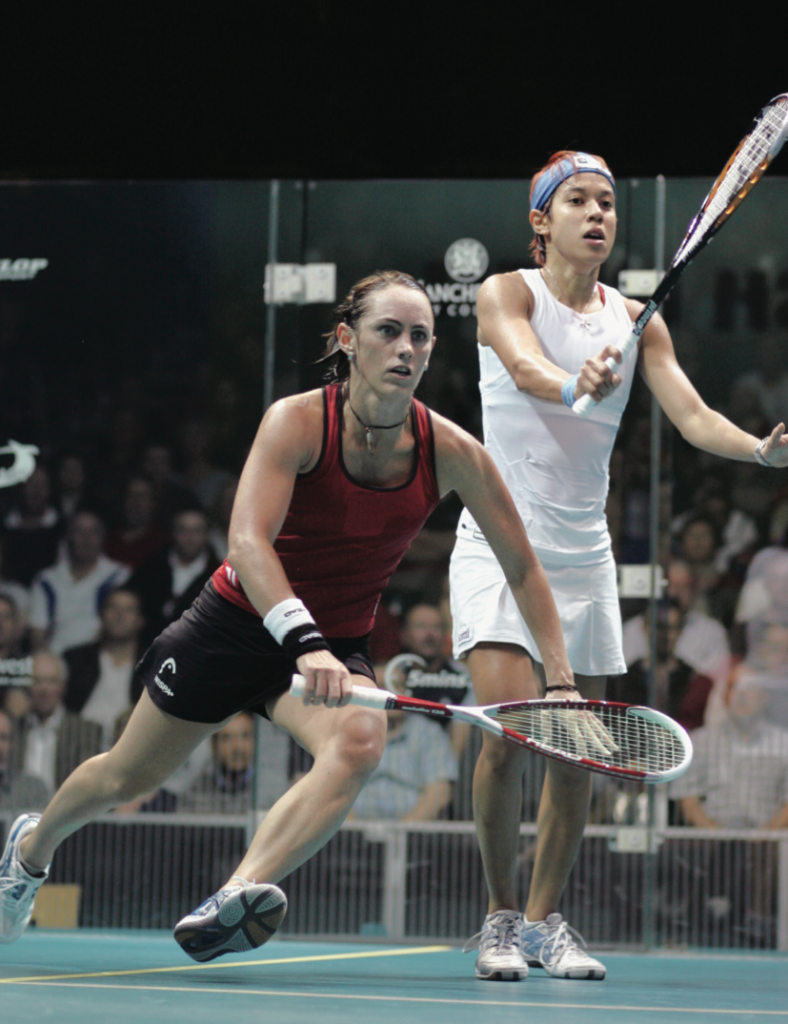
Of course one must be careful, for these were far from being the only reasons why David lost.
Grinham was excellent. Or at least, excellent from the middle of the match onwards. The Australian achieved this, her greatest success, and her third British Open title, by taking stock—often difficult to do at the height of the struggle—and by transforming her game like never before.
Grinham told herself she could equal David for speed, and if she hung in hard, she might equal her in the rallies too. After all, it was the champion who had the pressure, not her, she reminded herself.
Soon Grinham found she was often the more incisive at the front. And if she was afraid of David’s speed, she could contain instead and then gradually attack with slow-balling accuracy and length. Rarely did she hit hard, but she often prevented David from driving her from side to side, provided she eradicated the errors which had been disfiguring her athletically elegant game.
And this was one she really wanted. “Nicol’s had a lot of pressure and it’s obviously been building the longer she has been unbeaten—but we keep getting hungrier,” Grinham commented.
A hint of change happened with three very long rallies early in the third game. And once the score became closer, David’s mood seemed to change. The spectators could feel it. It was etched in her face
David still played a large part in some wonderful rallies, but no longer did she dominate. Neither was she able to change the pattern. It was as though her mind were frozen.
David nevertheless had one chance to sneak it with a match point at 8-7 in the fourth. But her attempted cross-court backhand was anticipated so well by Grinham, that she guided it with a half-volley, perfectly balanced, and landed it stone dead into the top right corner.
For David the fifth game was a disaster. She lost the first eight rallies, the seventh of which produced a fantasy moment, as though choreographed specially for Grinham celebrations.
With almost the whole court empty and her opponent on the floor, David’s attempted kill went like a magnet on to the racquet of Grinham, who blocked a winner while on the seat of her pants. It was the shot of her career, she said. It brought pandemonium. Moments later, for the victory of her career, there was even greater noise.
How did Grinham feel? “Shocking!” she said, but was referring to her body. Her mind felt different.
“To win the British Open twice was a good achievement but that was a couple of years ago, and I have not won a tournament for awhile and it was looking less and less likely. It’s my most satisfying win ever.”
David was so disappointed that she passed on her comments through Irving. “I have to think about what happened and work out what went wrong. I was 2-0 up and in total control. Rachael is so dangerous anywhere in the court and didn’t make half as many errors as she normally does. I have to contain her but, unfortunately, I was struggling to contain her for whatever reason.”
It was hard not to feel sympathy. But when nation-building is at stake, sympathy elsewhere may prove minimal. David is a well-rewarded woman, they may say. Don’t be distracted by that. Pressure can be a deadly serious affliction—serious enough to have ruined the lives of many a sportsman and woman.
However Gregory Gaultier, the first Frenchman to win the British Open, gave us some laughs in the men’s final. He also gave us some anger. And many other emotions.
A 5-11, 11-8, 11-4, 11-7, victory over compatriot Thierry Lincou also showed Gaultier to be playing as well as when he came within a point of last year’s world title. And yet, remarkably, it was his first title of 2007.
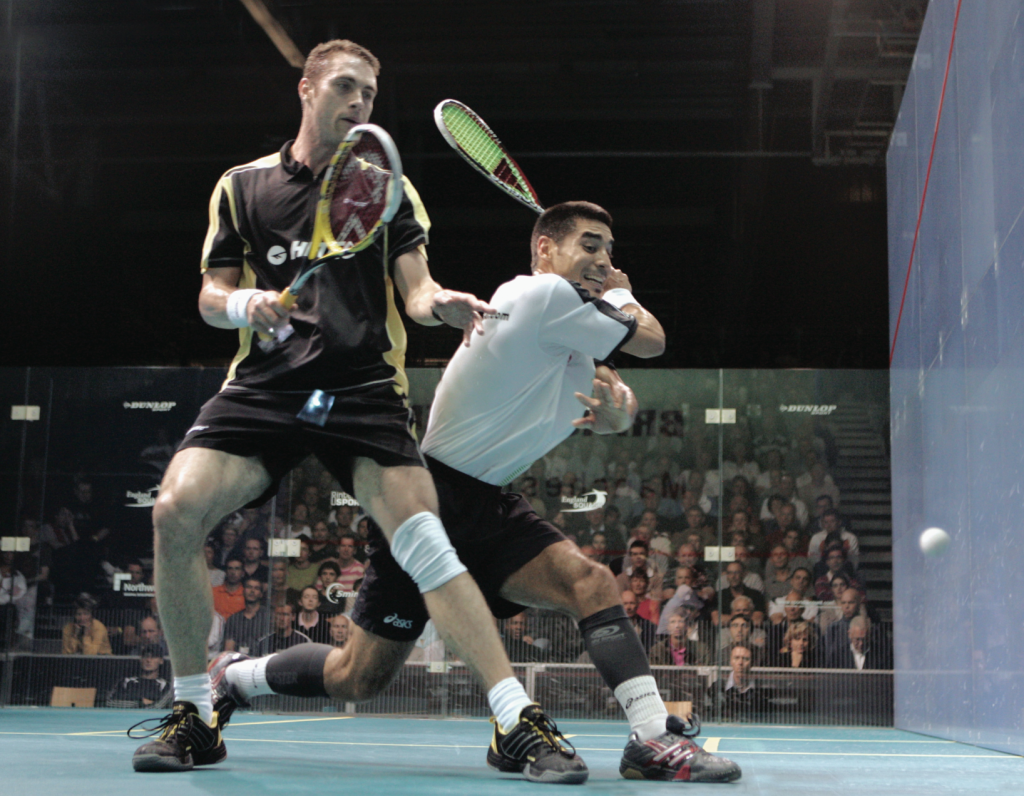
“I almost want to cry,” he told the crowd. “Go on then,” said one hard-nosed Englishman.
“It’s one of my dreams to win this title,” Gaultier responded graciously instead. “After the World Open this was my second dream, so it’s my biggest win ever. I am so pleased to be back at the level I always wanted to play. I had such a difficult time in the last six months with a very bad injury.”
The final hinted at a complex Gallic relationship. Lincou had been a mentor to Gaultier, then a substitute elder brother, then a rival, and though he is still a friend, the former world champion seemed irritated by the excesses of his pale and tense-looking buddy.
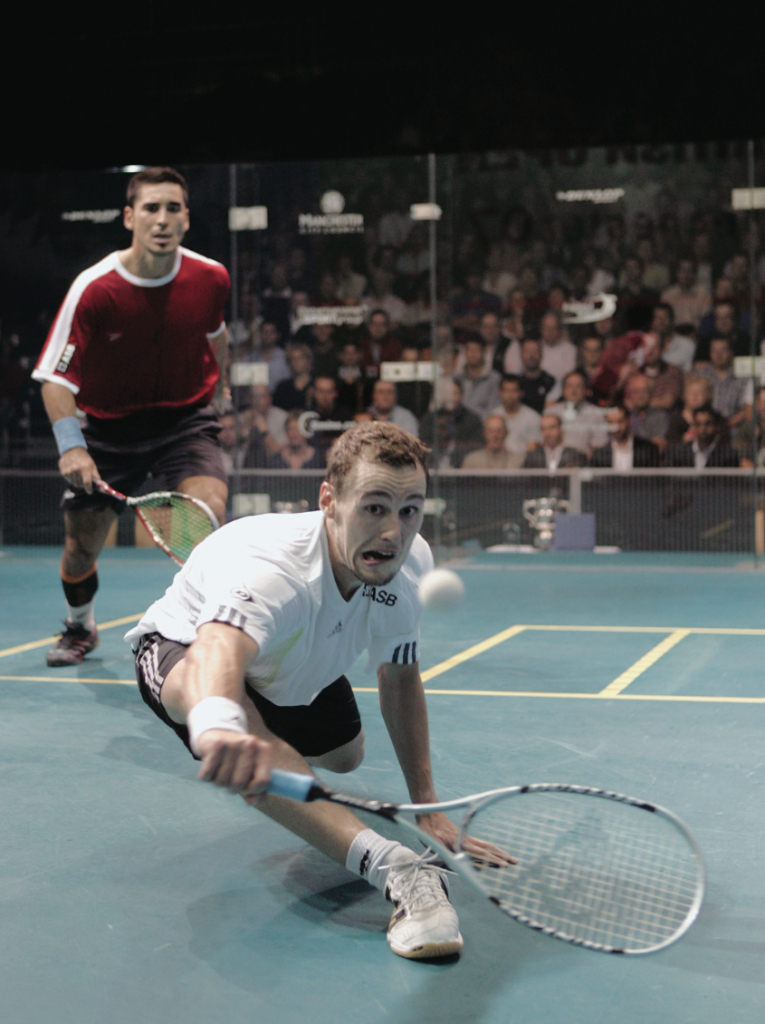
“Play the ball,” Gaultier once yelled at Lincou. “I can’t play the bloody thing,” retorted Lincou, making the crowd laugh at his elegant use of a blunt British swear word. When Lincou got the let from the referee, Gaultier yelled: “That’s twice he’s stitched me up!”
Later Gaultier collided with Lincou’s head, a painful blow, and then rubbed Lincou’s face and patted his hair, which may or may not have made the older man feel better. Then Gaultier thumped heavily into his opponent’s back, which Lincou visibly disliked. And Gaultier also had a ten-minute spell when he argued about almost every point.
However, his state of mind was gradually improved by the intensifying brilliance of his play, which was so full of arrogant disguise and dashing movement that it became hard for Lincou to impose his orderly patterns on the rallies.
Gaultier sometimes needs to become passionate to overcome his inner devils and to summon the chemistry of success. But he could also be charming and hilarious. And it was a relief that at the end they embraced like brothers.
“It’s not easy because we are close friends,” Gaultier informed spectators. “We always stay together, and share rooms together. No sex together—just friends. We talk about sex, but…”
Earlier Gaultier beat Amr Shabana, the world number one, as he had in Cairo, at last year’s World Open semis. One wondered how Shabana might cope with competing during the holy month of Ramadan, when he was supposed to fast.
“In the old days we used to go on (playing) when we were fasting, but I would rather be as strong as other people,” Shabana said.
“So I’m not fasting, but I’ll make up for it when I get home. I’ve become more religious—you get more connected to these issues as you get older. But I am not an extremist: I don’t believe in that. I am a modern Muslim,” he added pointedly.
Lincou had a great semifinal victory too—in four games over David Palmer, the world champion. Lincou played tight, tenacious, and well-planned squash but Palmer did not look entirely fit. The Aussie hurt his back in a fall the night before against James Willstrop, and now he sustained a gluteal strain.
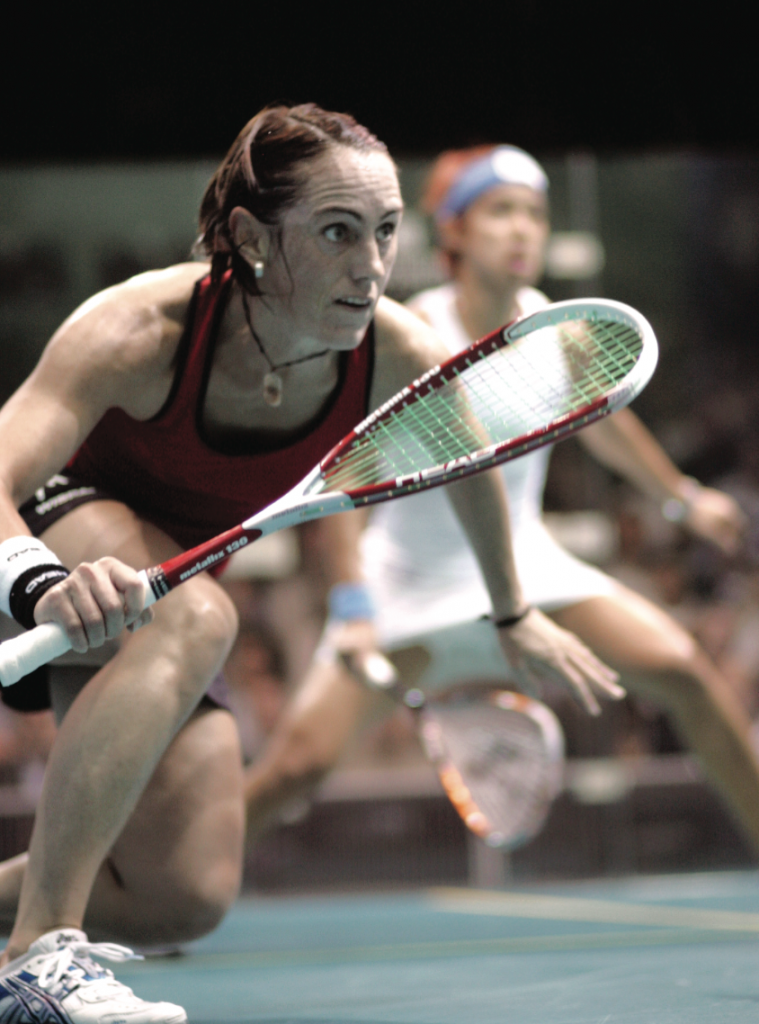
“We all know he’s one of the toughest players on the tour and I hope he recovers quickly,” said Lincou, realizing the potential gravity. “We’re both 31 and not that young. I hope he and I both carry on.”
Willstrop had almost halted Palmer, suggesting that he was back to his highest level since 2005. It is tempting to imagine that his romance with Vanessa Atkinson, the former world champion from Holland, was a reason why.
“It really helps to have someone with you,” agreed Atkinson, though she claimed their relationship “had nothing to do with squash.” Just as well, perhaps, seeing as she was a game and 4-0 up against Rachael Grinham before losing a bizarre contest which made a sandwich of one of the men’s matches.
That happened when Atkinson took a one-hour injury break after Grinham’s racquet had smashed into her playing hand, during which Gaultier and Peter Barker completed their quarterfinal—timed perfectly to enable the women to return to the center court and finish. It was like a variety show.
Rachael also won the 15th battle of the Grinham sisters—a mesmerizing multi-parabola of lobs and drops, with almost no requests for lets, lending credibility to the tale that their very similar styles developed back in Toowomba when as kids they went on court when they were not supposed to and played in the semi-dark. Hit hard and they would not have seen the ball. Talk and they would have been caught.
It was a colorful British Open. Lincou had black-and-white knee-length socks, and David a newly dyed version of her bronze-red hair, while Joey Barrington wore a pink head-scarf, and El Hindi some Nadal-style pirate pants.
Images are changing with the times. And the British Open, so close to extinction after 70 famous years, is now evolving in the struggle for survival.
The prize money of more than $120,000, was its biggest for several years. Next year, when it moves to Liverpool, it begins a five-year contract with annual increases which should enhance its new Super Series status. This is vigorous movement for what was almost considered a corpse.


